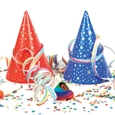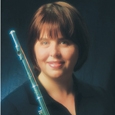The New Year traditionally brings an opportunity to reflect and make plans to change for the better. Why not also resolve to enhance and re-energize your flute lessons? Contrary to what you might think, great students do not have to be the best players. Show great effort and a curious and enthusiastic attitude and lessons will be more enjoyable for both student and teacher.
.jpg)
Attend Concerts
Flute recitals, chamber music, and symphonic concerts give you a chance to see and hear other flutists and musicians perform in a variety of styles and contexts. This exposure is invaluable; musicians learn so much from listening and watching others. A live performance offers lessons in performance etiquette and stage presence that are not captured in a YouTube video.
Listen to Recordings
Recordings are also essential to your development as a musician. The more you listen to good players, the more details and ideas you will develop for your own playing. Listen to good recordings regularly to discover new repertoire or enhance your understanding of current pieces. There are many opportunities for finding flute recordings in addition to purchasing CDs or individual tracks. Check a public or school library, visit artists’ webpages, and bookmark the online Flute Radio at http://www.larrykrantz.com/radio/flute-radio.html.
For current pieces, listen to several recordings while watching the score. If the composition is for flute and piano, listen carefully to the piano part to hear how it fits with the flute part. Mark piano cues in the flute part.
Check tempos of each recording with a metronome and make notes in the part. It is also helpful to compare phrasing ideas from one performer to the next. Listen for the dynamic contrasts, use of rubato or acceleration, articulation marks, and vibrato usage. Become familiar with different performers’ interpretations. Play along with a recording to get a sense of flow.
Participate
Attend flute masterclasses, workshops, and summer music festivals. Check the Calendar of Events sections on www.flutetalkmagazine.com and www.nfaonline.org. Check with your instructor, local university, and nearby flute club for opportunities to enhance your musical education. Become an active member of your local flute club to keep informed about flute events in your area. Many flute clubs provide member’s only events and competitions.
Perform Often
Music is a performance art, one which is meant to be shared with others. Performance provides a chance to express yourself musically and creatively, and demonstrate the skills learned. It also helps develop poise and confidence and creates a sense of accomplishment. If you learn to play well while nervous or under pressure, you become an even better player under normal circumstances. It takes repeated practice to control nervous tendencies including rushing or not using enough air. There are many community and religious organizations who would gratefully appreciate your musical gifts.
Practice with a Goal
Practice regularly at home without being prodded or coerced and set daily goals. Practice sessions offer great opportunities for self-discovery and to challenge yourself mentally and physically. Make this time as efficient and effective as possible. Use a metronome and tuner wisely. Take notes during lessons and practice sessions. Write down questions that pop up while you practice. In a practice log, list what you practiced, for how long, and what specific goal you tried to achieve. Always know what the assigned lesson material is and come to lessons prepared to play your best.
Join an Ensemble
Participation in a flute choir, band, orchestra, or chamber ensemble will help hone rhythm, intonation, technical and musicianship skills. Each type of ensemble offers exposure to different repertoire, performance techniques, and the leadership from other music educators, which will mold you into a well-rounded musician.
Research
Become a flute scholar. Research each piece and its composer, discovering the musical era in which the piece was written, important facts about the composer, why they composed the piece, the circumstances surrounding the first performance, and what else occurred historically at the time. Look up all terms and symbols to better understand the music and interpret the composer’s intentions. Visit such sites as www.fluteark.com and www.music.vt.edu/musicdictionary for help and additional information.
Develop Your Ear
There are computer programs or online sites that offer excellent resources to develop your ear, music theory skills, and improvisational technique. Two sites to start with are: www.practicespot.com/home.php and www.8notes.com/theory/






